Infant Crying, Sleeping, and Feeding Problems in Times of Societal Crises: The Mediating Role of Parenting Stress on Parenting Behavior in Fathers and Mothers
Abstract
1. Introduction
2. Materials and Methods
2.1. Participants and Procedure
2.2. Measurements
2.2.1. Sociodemographic Characteristics
2.2.2. Infant Crying, Sleeping, and Feeding Problems
2.2.3. Parenting Stress
2.2.4. Parenting Behavior
2.2.5. Statistical Analysis
3. Results
3.1. Descriptives
3.2. Infant Crying, Sleeping, and Feeding Problems During and After the Pandemic
3.3. Parenting Stress and Parenting Behavior in Mothers and Fathers in the Post-Pandemic Sample
3.4. Relationships Between Infant Crying, Sleeping, and Feeding Problems, Parenting Stress, and Parenting Behaviors in the Post-Pandemic Sample
3.4.1. Infant Crying, Sleeping, and Feeding Problems, Parenting Stress, and Sensitivity in Mothers and Fathers
3.4.2. Infant Crying, Sleeping, and Feeding Problems, Parenting Stress, and Responsiveness in Mothers and Fathers
3.4.3. Infant Crying, Sleeping, and Feeding Problems, Parenting Stress, and Over-Reactivity in Mothers and Fathers
4. Discussion
5. Conclusions
Author Contributions
Funding
Institutional Review Board Statement
Informed Consent Statement
Data Availability Statement
Acknowledgments
Conflicts of Interest
References
- Egle, U.T.; Franz, M.; Joraschky, P.; Lampe, A.; Seiffge-Krenke, I.; Cierpka, M. Gesundheitliche Langzeitfolgen psychosozialer Belastungen in der Kindheit—Ein Update. Bundesgesundheitsblatt Gesundheitsforschung Gesundheitsschutz 2016, 59, 1247–1254. [Google Scholar] [CrossRef]
- Laucht, M.; Schmidt, M.H.; Esser, G. Motorische, kognitive und sozial-emotionale Entwicklung von 11-Jährigen mit frühkindlichen Risikobelastungen: Späte Folgen. Z. Kinder Jugendpsychiatr. Psychother. 2002, 30, 5–19. [Google Scholar] [CrossRef]
- Heilig, L. Risikokonstellationen in der frühen Kindheit: Auswirkungen biologischer und psychologischer Vulnerabilitäten sowie psychosozialer Stressoren auf kindliche Entwicklungsverläufe. Z. Erzieh. 2014, 17, 263–280. [Google Scholar] [CrossRef]
- Huebener, M.; Waights, S.; Spiess, C.K.; Siegel, N.A.; Wagner, G.G. Parental well-being in times of COVID-19 in Germany. Rev. Econ. Househ. 2021, 19, 91–122. [Google Scholar] [CrossRef] [PubMed]
- Panda, P.K.; Gupta, J.; Chowdhury, S.R.; Kumar, R.; Meena, A.K.; Madaan, P.; Sharawat, I.K.; Gulati, S. Psychological and Behavioral Impact of Lockdown and Quarantine Measures for COVID-19 Pandemic on Children, Adolescents and Caregivers: A Systematic Review and Meta-Analysis. J. Trop. Pediatr. 2021, 67, fmaa122. [Google Scholar] [CrossRef]
- Chawla, N.; Tom, A.; Sen, M.S.; Sagar, R. Psychological Impact of COVID-19 on Children and Ad-olescents: A Systematic Review. Indian J. Psychol. Med. 2021, 43, 294–299. [Google Scholar] [CrossRef] [PubMed]
- Schlack, R.; Neuperdt, L.; Junker, S.; Eicher, S.; Hölling, H.; Thom, J.; Ravens-Sieberer, U.; Beyer, A.-K. Changes in mental health in the German child and adolescent population during the COVID-19 pandemic—Results of a rapid review. J. Health Monit. 2023, 8 (Suppl. 1), 2–72. [Google Scholar]
- Lopatina, O.L.; Panina, Y.A.; Malinovskaya, N.A.; Salmina, A.B. Early life stress and brain plasticity: From molecular alterations to aberrant memory and behavior. Rev. Neurosci. 2021, 32, 131–142. [Google Scholar] [CrossRef] [PubMed]
- Brown, T.T.; Jernigan, T.L. Brain development during the preschool years. Neuropsychol. Rev. 2012, 22, 313–333. [Google Scholar] [CrossRef]
- Knickmeyer, R.C.; Gouttard, S.; Kang, C.; Evans, D.; Wilber, K.; Smith, J.K.; Hamer, R.M.; Lin, W.; Gerig, G.; Gilmore, J.H. A structural MRI study of human brain development from birth to 2 years. J. Neurosci. 2008, 28, 12176–12182. [Google Scholar] [CrossRef] [PubMed]
- Ziegler, M.; Wollwerth de Chuquisengo, R.; Mall, V.; Licata-Dandel, M. Frühkindliche psychische Störungen: Exzessives Schreien, Schlaf- und Fütterstörungen sowie Interventionen am Beispiel des “Münchner Modells”. Bundesgesundheitsblatt-Gesundheitsforschung-Gesundheitsschutz 2023, 66, 752–760. [Google Scholar] [CrossRef] [PubMed]
- Bilgin, A.; Wolke, D. Regulatory Problems in Very Preterm and Full-Term Infants Over the First 18 Months. J. Dev. Behav. Pediatr. 2016, 37, 298–305. [Google Scholar] [CrossRef]
- Cooke, J.E.; Kochendorfer, L.B.; Stuart-Parrigon, K.L.; Koehn, A.J.; Kerns, K.A. Parent-child attachment and children’s experience and regulation of emotion: A meta-analytic review. Emotion 2019, 19, 1103–1126. [Google Scholar] [CrossRef]
- Petzoldt, J.; Wittchen, H.-U.; Einsle, F.; Martini, J. Maternal anxiety versus depressive disorders: Specific relations to infants’ crying, feeding and sleeping problems. Child Care Health Dev. 2016, 42, 231–245. [Google Scholar] [CrossRef] [PubMed]
- Rask, C.U.; Ørnbøl, E.; Olsen, E.M.; Fink, P.; Skovgaard, A.M. Infant behaviors are predictive of functional somatic symptoms at ages 5–7 years: Results from the Copenhagen Child Cohort CCC2000. J. Pediatr. 2013, 162, 335–342. [Google Scholar] [CrossRef]
- Sidor, A.; Fischer, C.; Cierpka, M. The link between infant regulatory problems, temperament traits, maternal depressive symptoms and children’s psychopathological symptoms at age three: A lon-gitudinal study in a German at-risk sample. Child Adolesc. Psychiatry Ment. Health 2017, 11, 10. [Google Scholar] [CrossRef] [PubMed]
- Galling, B.; Brauer, H.; Struck, P.; Krogmann, A.; Gross-Hemmi, M.; Prehn-Kristensen, A.; Mudra, S. The impact of crying, sleeping, and eating problems in infants on childhood behavioral outcomes: A meta-analysis. Front. Child Adolesc. Psychiatry 2023, 1, 1099406. [Google Scholar] [CrossRef]
- Perez, A.; Göbel, A.; Stuhrmann, L.Y.; Schepanski, S.; Singer, D.; Bindt, C.; Mudra, S. Born Under COVID-19 Pandemic Conditions: Infant Regulatory Problems and Maternal Mental Health at 7 Months Postpartum. Front. Psychol. 2021, 12, 805543. [Google Scholar] [CrossRef] [PubMed]
- Sprengeler, M.K.; Mattheß, J.; Galeris, M.-G.; Eckert, M.; Koch, G.; Reinhold, T.; Berghöfer, A.; Fricke, J.; Roll, S.; Keil, T.; et al. Being an Infant in a Pandemic: Influences of the COVID-19 Pandemic on Infants, Toddlers and Their Mothers in a Clinical Population. Children 2023, 10, 1885. [Google Scholar] [CrossRef] [PubMed]
- Bradley, H.; Fine, D.; Minai, Y.; Gilabert, L.; Gregory, K.; Smith, L.; Gao, W.; Giase, G.; Krogh-Jespersen, S.; Zhang, Y.; et al. Maternal perceived stress and infant behavior during the COVID-19 pandemic. Pediatr. Res. 2023, 94, 2098–2104. [Google Scholar] [CrossRef] [PubMed]
- Nazzari, S.; Pili, M.P.; Günay, Y.; Provenzi, L. Pandemic babies: A systematic review of the asso-ciation between maternal pandemic-related stress during pregnancy and infant development. Neurosci. Biobehav. Rev. 2024, 162, 105723. [Google Scholar] [CrossRef] [PubMed]
- Provenzi, L.; Grumi, S.; Altieri, L.; Bensi, G.; Bertazzoli, E.; Biasucci, G.; Cavallini, A.; Decembrino, L.; Falcone, R.; Freddi, A.; et al. Prenatal maternal stress during the COVID-19 pandemic and infant regulatory capacity at 3 months: A longitudinal study. Dev. Psychopathol. 2023, 35, 35–43. [Google Scholar] [CrossRef]
- Wiley, K.S.; Fox, M.M.; Gildner, T.E.; Thayer, Z.M. A longitudinal study of how women’s prenatal and postnatal concerns related to the COVID-19 pandemic predicts their infants’ social-emotional development. Child Dev. 2023, 94, 1356–1367. [Google Scholar] [CrossRef] [PubMed]
- Reinelt, T.; Suppiger, D.; Frey, C.; Oertel, R.; Natalucci, G. Infant regulation during the pandemic: Associations with maternal response to the COVID-19 pandemic, well-being, and socio-emotional investment. Infancy 2023, 28, 9–33. [Google Scholar] [CrossRef]
- Buechel, C.; Nehring, I.; Seifert, C.; Eber, S.; Behrends, U.; Mall, V.; Friedmann, A. A cross-sectional investigation of psychosocial stress factors in German families with children aged 0-3 years during the COVID-19 pandemic: Initial results of the CoronabaBY study. Child Adolesc. Psychiatry Ment. Health 2022, 16, 37. [Google Scholar] [CrossRef]
- Louie, P.; Upenieks, L.; Hill, T.D. Cumulative Pandemic Stressors, Psychosocial Resources, and Psychological Distress: Toward a More Comprehensive Test of a Pandemic Stress Process. Soc. Ment. Health 2023, 13, 245–260. [Google Scholar] [CrossRef]
- Clayton, S. Climate anxiety: Psychological responses to climate change. J. Anxiety Disord. 2020, 74, 102263. [Google Scholar] [CrossRef]
- Lass-Hennemann, J.; Sopp, M.R.; Ruf, N.; Equit, M.; Schäfer, S.K.; Wirth, B.E.; Michael, T. Generation climate crisis, COVID-19, and Russia-Ukraine-War: Global crises and mental health in adolescents. Eur. Child Adolesc. Psychiatry 2024, 33, 2203–2216. [Google Scholar] [CrossRef]
- Movsisyan, A.; Wendel, F.; Bethel, A.; Coenen, M.; Krajewska, J.; Littlecott, H.; Stöckl, H.; Voss, S.; Wollmershäuser, T.; Rehfuess, E. Inflation and health: A global scoping review. Lancet Glob. Health 2024, 12, e1038–e1048. [Google Scholar] [CrossRef]
- Malia, J.A. Basic Concepts and Models of Family Stress. Stress Trauma Crisis 2006, 9, 141–160. [Google Scholar] [CrossRef]
- Georg, A.K.; Bark, C.; Wiehmann, J.; Taubner, S. Frühkindliche Regulationsstörungen: Störungsbilder und Behandlungskonzepte. Psychotherapeut 2022, 67, 265–278. [Google Scholar] [CrossRef]
- Cooke, J.E.; Deneault, A.-A.; Devereux, C.; Eirich, R.; Fearon, R.M.P.; Madigan, S. Parental sensitivity and child behavioral problems: A meta-analytic review. Child Dev. 2022, 93, 1231–1248. [Google Scholar] [CrossRef]
- Ward, K.P.; Lee, S.J. Mothers’ and Fathers’ Parenting Stress, Responsiveness, and Child Wellbeing Among Low-Income Families. Child. Youth Serv. Rev. 2020, 116, 105218. [Google Scholar] [CrossRef]
- Deans, C.L. Maternal sensitivity, its relationship with child outcomes, and interventions that address it: A sys-tematic literature review. Early Child Dev. Care 2018, 190, 252–275. [Google Scholar] [CrossRef]
- Goldstein, L.H.; Harvey, E.A.; Friedman-Weieneth, J.L. Examining subtypes of behavior problems among 3-year-old children, Part III: Investigating differences in parenting practices and parenting stress. J. Abnorm. Child Psychol. 2007, 35, 125–136. [Google Scholar] [CrossRef]
- Abidin, R.R. Introduction to the Special issue: The Stresses of Parenting. J. Clin. Child Psychol. 1990, 19, 298–301. [Google Scholar] [CrossRef]
- Beebe, S.A.; Casey, R.; Pinto-Martin, J. Association of reported infant crying and maternal parenting stress. Clin. Pediatr. 1993, 32, 15–19. [Google Scholar] [CrossRef] [PubMed]
- Postert, C.; Averbeck-Holocher, M.; Achtergarde, S.; Müller, J.M.; Furniss, T. Regulatory disorders in early childhood: Correlates in child behavior, parent-child relationship, and parental mental health. Infant Ment. Health J. 2012, 33, 173–186. [Google Scholar] [CrossRef] [PubMed]
- Chung, G.; Tilley, J.L.; Netto, N.; Chan, A.; Lanier, P. Parenting stress and its impact on parental and child functioning during the COVID-19 pandemic: A meta-analytical review. Int. J. Stress Manag. 2024, 31, 238–251. [Google Scholar] [CrossRef]
- Chung, G.; Lanier, P.; Wong, P.Y.J. Mediating Effects of Parental Stress on Harsh Parenting and Parent-Child Relationship during Coronavirus (COVID-19) Pandemic in Singapore. J. Fam. Violence 2022, 37, 801–812. [Google Scholar] [CrossRef]
- Friedmann, A.; Buechel, C.; Seifert, C.; Eber, S.; Mall, V.; Nehring, I. Easing pandemic-related re-strictions, easing psychosocial stress factors in families with infants and toddlers? Cross-sectional results of the three wave CoronabaBY study from Germany. Child Adolesc. Psychiatry Ment. Health 2023, 17, 76. [Google Scholar] [CrossRef] [PubMed]
- Richter, K.; Buechel, C.; Augustin, M.; Friedmann, A.; Mall, V.; Nehring, I. Psychosocial stress in young families after the pandemic: No time to rest. Res. Sq. 2024. [Google Scholar] [CrossRef]
- Oberndorfer, R.; Rost, H. Neue Väter—Anspruch und Realität. Z. Fam. 2005, 17, 50–65. [Google Scholar]
- Statistisches Bundesamt. Elterngeld 2022: Väteranteil Steigt Weiter auf 26.1%. 2022. Available online: https://www.destatis.de/DE/Presse/Pressemitteilungen/2023/03/PD23_123_22922.html (accessed on 6 November 2024).
- Cito, G.; Micelli, E.; Cocci, A.; Polloni, G.; Coccia, M.E.; Carini, M.; Minervini, A.; Natali, A. Paternal Behaviors in the Era of COVID-19. World J. Men’s Health 2020, 38, 251–253. [Google Scholar] [CrossRef]
- Margaria, A. Fathers, Childcare and COVID-19. Fem. Leg. Stud. 2021, 29, 133–144. [Google Scholar] [CrossRef]
- Weissbourd, R.; Batanova, M.; McIntyre, J.; Torres, E. How the Pandemic Is Strengthening Fathers’ Relationships with Their Children. 2020. Available online: https://mcc.gse.harvard.edu/s/report-how-the-pandemic-is-strengthening-fathers-relationships-with-their-children-final.pdf (accessed on 10 November 2024).
- Kellner, R. Die erschöpfte Mutter. Z. Psychodrama Soziom. 2024, 23, 315–327. [Google Scholar] [CrossRef]
- Buechel, C.; Friedmann, A.; Eber, S.; Behrends, U.; Mall, V.; Nehring, I. The change of psychosocial stress factors in families with infants and toddlers during the COVID-19 pandemic. A longitudinal perspective on the CoronabaBY study from Germany. Front. Pediatr. 2024, 12, 1354089. [Google Scholar] [CrossRef]
- Schmidtke, C.; Kuntz, B.; Starker, A.; Lampert, T. Inanspruchnahme der Früherkennungsuntersuchungen für Kinder in Deutschland—Querschnittergebnisse aus KiGGS Welle 2; Robert Koch-Institut: Berlin, Germany, 2018. [Google Scholar]
- Gross, S.; Reck, C.; Thiel-Bonney, C.; Cierpka, M. Empirische Grundlagen des Fragebogens zum Schreien, Füttern und Schlafen (SFS). Prax. Kinderpsychol. Kinderpsychiatr. 2013, 62, 327–347. [Google Scholar] [CrossRef]
- Wessel, M.A.; Cobb, J.C.; Jackson, E.B.; Harris, G.S.; Detwiler, A.C. Paroxysmal fussing in infancy, sometimes called “colic”. Pediatrics 1954, 14, 421–435. [Google Scholar] [CrossRef]
- Tröster, H. Eltern-Belastungs-Inventar (EBI): Deutsche Version des Parenting Stress Index (PSI); Hogrefe: St. Newburyport, MA, USA, 2010. [Google Scholar]
- Testzentrale. EBI. Eltern-Belastungs-Inventar. 2010. Available online: https://www.testzentrale.de/shop/eltern-belastungs-inventar.html (accessed on 13 October 2024).
- Verhoeven, M.; Deković, M.; Bodden, D.; van Baar, A.L. Development and initial validation of the comprehensive early childhood parenting questionnaire (CECPAQ) for parents of 1–4 year-olds. Eur. J. Dev. Psychol. 2017, 14, 233–247. [Google Scholar] [CrossRef]
- Preacher, K.J.; Hayes, A.F. SPSS and SAS procedures for estimating indirect effects in simple mediation models. Behav. Res. Methods Instrum. Comput. 2004, 36, 717–731. [Google Scholar] [CrossRef]
- Lindberg, L.; Bohlin, G.; Hagekull, B. Early feeding problems in a normal population. Int. J. Eat. Disord. 1991, 10, 395–405. [Google Scholar] [CrossRef]
- Lorenz, S.; Ulrich, S.M.; Sann, A.; Liel, C. Self-Reported Psychosocial Stress in Parents with Small Children. Dtsch. Arztebl. Int. 2020, 117, 709–716. [Google Scholar] [CrossRef] [PubMed]
- Olsen, A.L.; Ammitzbøll, J.; Olsen, E.M.; Skovgaard, A.M. Problems of feeding, sleeping and excessive crying in infancy: A general population study. Arch. Dis. Child. 2019, 104, 1034–1041. [Google Scholar] [CrossRef]
- Wake, M.; Morton-Allen, E.; Poulakis, Z.; Hiscock, H.; Gallagher, S.; Oberklaid, F. Prevalence, stability, and outcomes of cry-fuss and sleep problems in the first 2 years of life: Prospective communi-ty-based study. Pediatrics 2006, 117, 836–842. [Google Scholar] [CrossRef] [PubMed]
- Wolke, D.; Schmid, G.; Schreier, A.; Meyer, R. Crying and feeding problems in infancy and cognitive outcome in preschool children born at risk: A prospective population study. J. Dev. Behav. Pediatr. 2009, 30, 226–238. [Google Scholar] [CrossRef] [PubMed]
- Ainsworth, M.D.S.; Blehar, M.C.; Waters, E.; Wall, S.N. Patterns of Attachment; Psychology Press: London, UK, 2015. [Google Scholar]
- Sroufe, L.A. Early relationships and the development of children. Infant Ment. Health J. 2000, 21, 67–74. [Google Scholar] [CrossRef]
- Moradian, S.; Bäuerle, A.; Schweda, A.; Musche, V.; Kohler, H.; Fink, M.; Weismüller, B.; Benecke, A.V.; Dörrie, N.; Skoda, E.M.; et al. Differences and simi-larities between the impact of the first and the second COVID-19-lockdown on mental health and safety behaviour in Germany. J. Public Health 2021, 43, 710–713. [Google Scholar] [CrossRef]
- Petzoldt, J. Systematic review on maternal depression versus anxiety in relation to excessive infant crying: It is all about the timing. Arch. Women’s Ment. Health 2018, 21, 15–30. [Google Scholar] [CrossRef] [PubMed]
- Samdan, G.; Kiel, N.; Petermann, F.; Rothenfußer, S.; Zierul, C.; Reinelt, T. The relationship between parental behavior and infant regulation: A systematic review. Dev. Rev. 2020, 57, 100923. [Google Scholar] [CrossRef]
- Kim, J.; Cicchetti, D. Longitudinal pathways linking child maltreatment, emotion regulation, peer relations, and psychopathology. J. Child Psychol. Psychiatry 2010, 51, 706–716. [Google Scholar] [CrossRef]
- Philbrook, L.E.; Teti, D.M. Bidirectional associations between bedtime parenting and infant sleep: Parenting quality, parenting practices, and their interaction. J. Fam. Psychol. 2016, 30, 431–441. [Google Scholar] [CrossRef] [PubMed]
- Georg, A.K.; Schröder-Pfeifer, P.; Cierpka, M.; Taubner, S. Maternal Parenting Stress in the Face of Early Regulatory Disorders in Infancy: A Machine Learning Approach to Identify What Matters Most. Front. Psychiatry 2021, 12, 663285. [Google Scholar] [CrossRef] [PubMed]
- Le, Y.; Fredman, S.J.; Feinberg, M.E. Parenting stress mediates the association between negative affectivity and harsh parenting: A longitudinal dyadic analysis. J. Fam. Psychol. 2017, 31, 679–688. [Google Scholar] [CrossRef] [PubMed]
- Mak, M.C.K.; Yin, L.; Li, M.; Cheung, R.Y.; Oon, P.-T. The Relation between Parenting Stress and Child Behavior Problems: Negative Parenting Styles as Mediator. J. Child Fam. Stud. 2020, 29, 2993–3003. [Google Scholar] [CrossRef]
- Deater-Deckard, K.; Panneton, R. Parental Stress and Early Child Development; Springer International Publishing: Cham, Switzerland, 2017. [Google Scholar]
- Kaley, F.; Reid, V.; Flynn, E. Investigating the biographic, social and temperamental correlates of young infants’ sleeping, crying and feeding routines. Infant Behav. Dev. 2012, 35, 596–605. [Google Scholar] [CrossRef]
- Thunström, M. Severe sleep problems among infants in a normal population in Sweden: Prevalence, severity and correlates. Acta Pædiatrica 1999, 88, 1356–1363. [Google Scholar] [CrossRef]
- Weissbluth, M. Naps in children: 6 months–7 years. Sleep 1995, 18, 82–87. [Google Scholar] [CrossRef] [PubMed]
- Yalçin, S.S.; Orün, E.; Mutlu, B.; Madendağ, Y.; Sinici, I.; Dursun, A.; Özkara, H.A.; Üstünyurt, Z.; Kutluk, Ş.; Yurdakök, K. Why are they having infant colic? A nested case-control study. Paediatr. Perinat. Epidemiol. 2010, 24, 584–596. [Google Scholar] [CrossRef] [PubMed]
- Brazelton, T.B. Crying in infancy. Pediatrics 1962, 29, 579–588. [Google Scholar] [CrossRef]
- St James-Roberts, I.; Halil, T. Infant crying patterns in the first year: Normal community and clinical findings. J. Child Psychol. Psychiatry 1991, 32, 951–968. [Google Scholar] [CrossRef] [PubMed]
- Mindell, J.A.; Leichman, E.S.; Composto, J.; Lee, C.; Bhullar, B.; Walters, R.M. Development of infant and toddler sleep patterns: Real-world data from a mobile application. J. Sleep Res. 2016, 25, 508–516. [Google Scholar] [CrossRef] [PubMed]
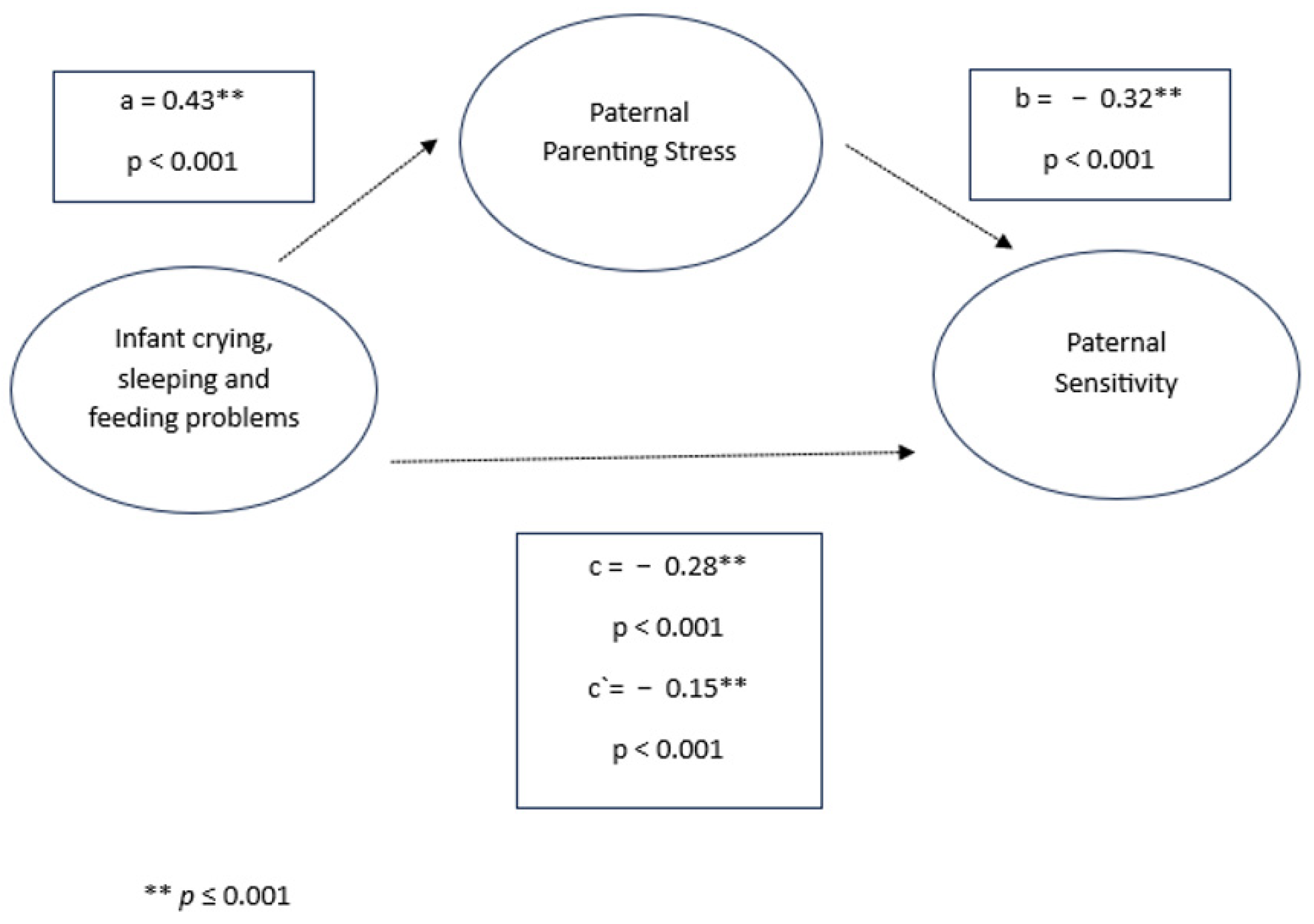
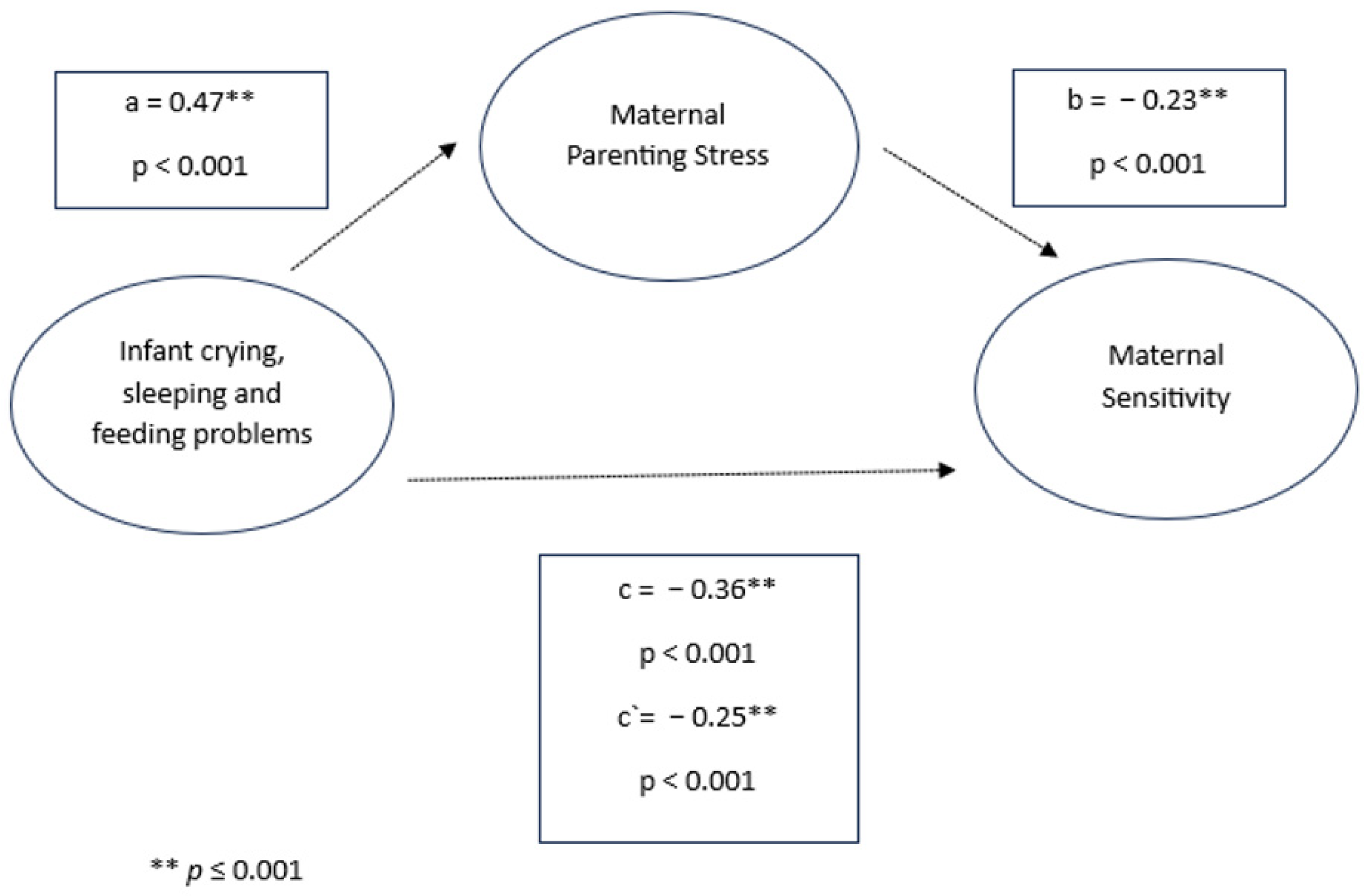
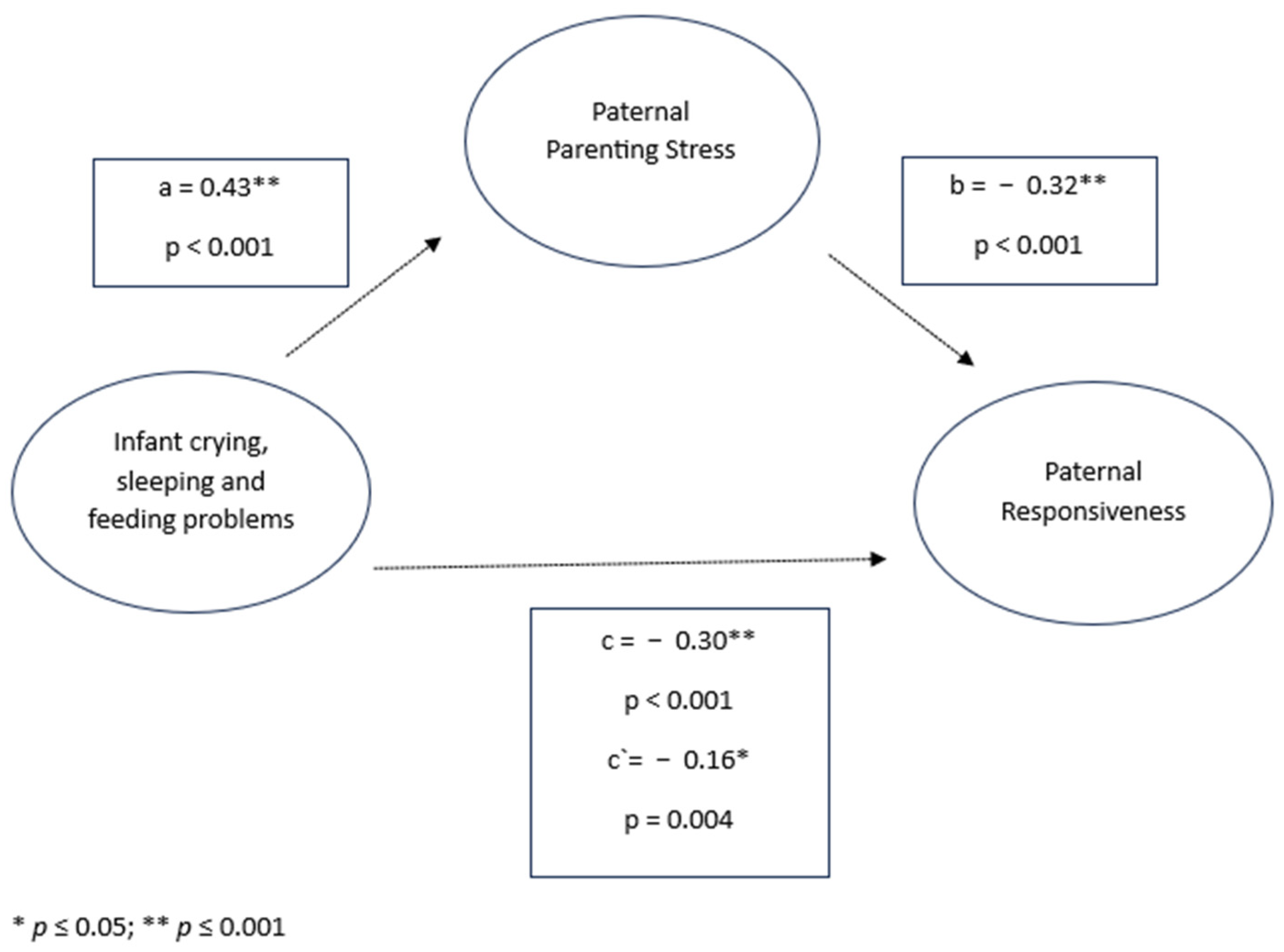

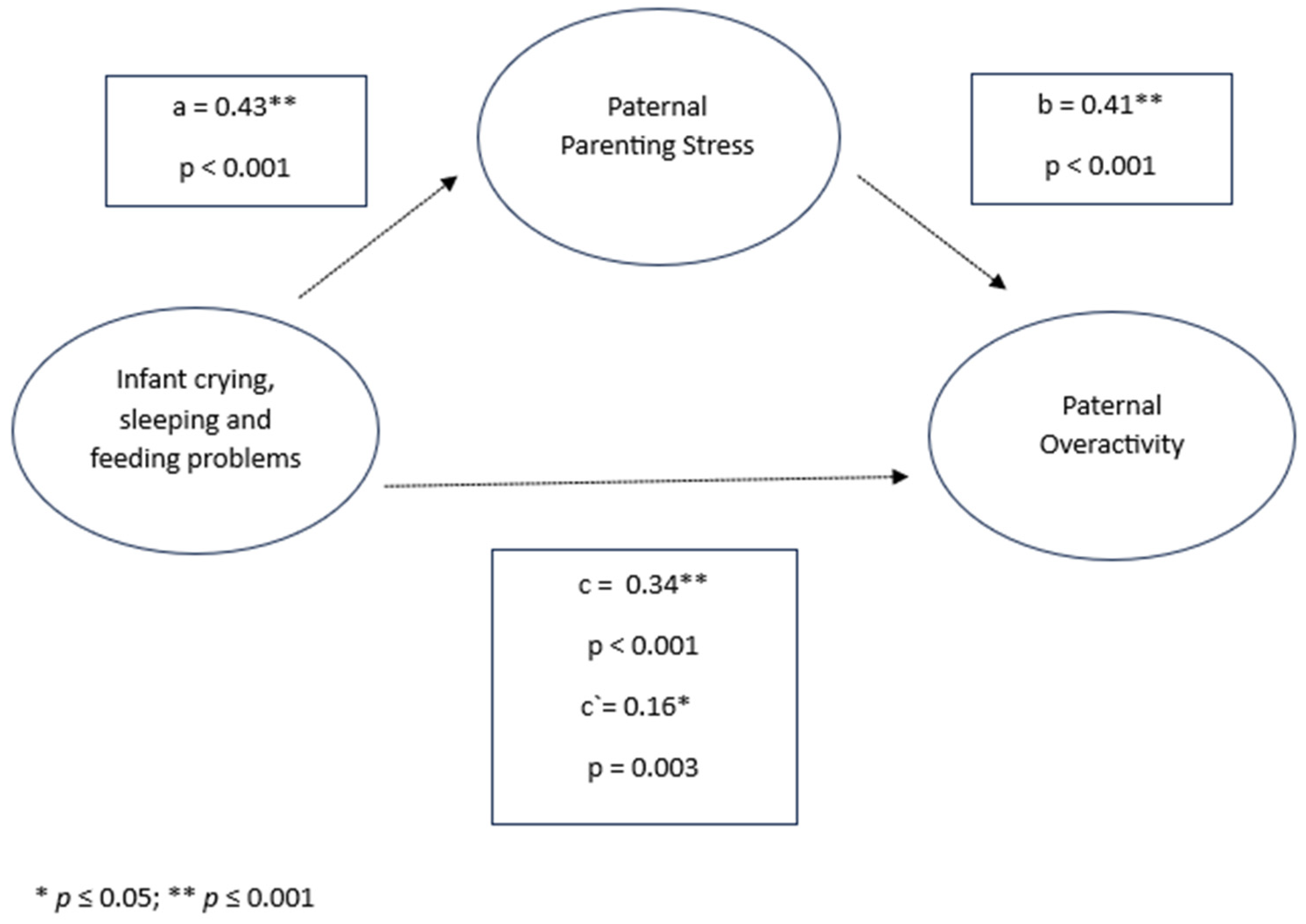
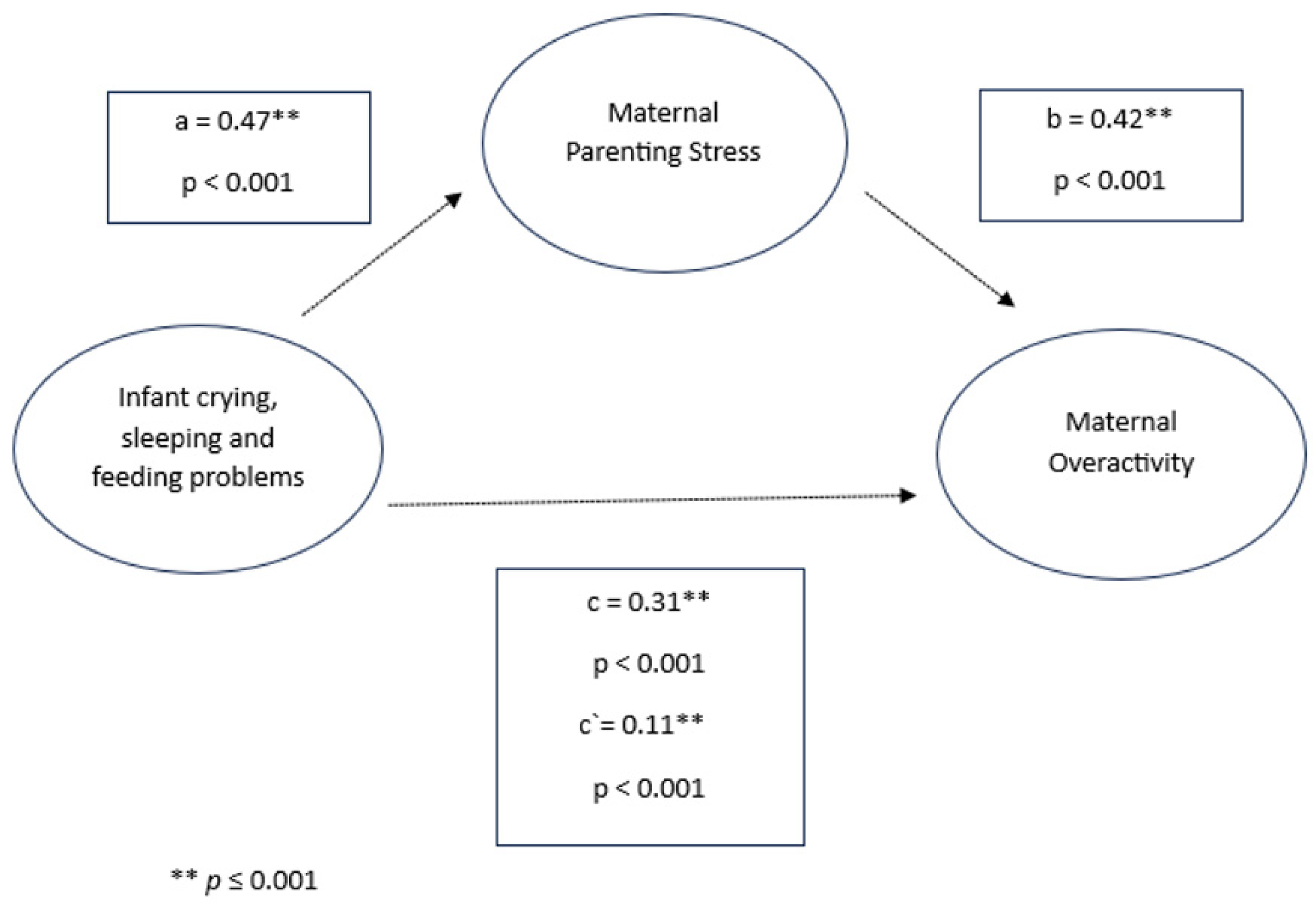
| Post-Pandemic Group (JuFaBY) (n = 5648) | Pandemic Group (CoronabaBY) (n = 1391) | Statistical Significance (Effect Size) | |||
|---|---|---|---|---|---|
| Parents | |||||
| Parental age (years), mean (SD) | 32.06 (4.55) | 32.75 (4.57) | b <0.001 * (0.15) | ||
| % | n | % | n | ||
| Fathers | 5.6 | 314 | 6.8 | 95 | a 0.053 (−0.02) |
| (At least one) parent born in Germany | 96.0 | 5423 | 91.0 | 1266 | n.a. |
| Single parent | 7.4 | 420 | 7.5 | 105 | a 0.864 (0.00) |
| Level of education | a <0.001 * (0.06) | ||||
| High | 59.5 | 3362 | 62.4 | 847 | |
| Low | 38.6 | 2178 | 37.6 | 511 | |
| Others | 1.9 | 108 | 2.4 | 33 | |
| Children | |||||
| Mean infant age in months, (SD) | 4.86 (3.83) | 5.47 (3.51) | b <0.001 * (0.16) | ||
| % | n | % | n | ||
| Male | 53.3 | 3013 | 51.8 | 720 | a 0.297 (0.02) |
| Siblings | 30.5 | 1722 | 43.6 | 607 | a <0.001 * (−0.11) |
| Mothers (n = 5334) | Fathers (n = 314) | Statistical Significance (Effect Size) | |||
|---|---|---|---|---|---|
| Parents | |||||
| Parental age (years), mean (SD) | 31.91 (4.47) | 34.50 (5.24) | b <0.001 ** (−0.57) | ||
| % | n | % | n | ||
| Parent born in Germany | 96.2 | 5129 | 93.6 | 294 | a <0.001 ** (0.10) |
| Predominantly single parent | 7.8 | 417 | 1.0 | 3 | a <0.001 ** (−0.06) |
| Level of education | a <0.001 ** (0.08) | ||||
| High | 58.6 | 3126 | 75.2 | 236 | |
| Low | 39.4 | 2103 | 23.9 | 75 | |
| Others | 2.0 | 105 | 1.0 | 3 | |
| Children | |||||
| Infant age (months), mean (SD) | 4.93 (3.85) | 3.65 (3.37) | b <0.001 ** (0.34) | ||
| % | n | % | n | ||
| Male | 53.4 | 2851 | 51.6 | 162 | a 0.310 (0.02) |
| Siblings | 31.2 | 1662 | 19.1 | 60 | a <0.001** (−0.06) |
| Infant Mental Health (CSF) (Above Cut-Off) | Post-Pandemic Group (JuFaBY) (n = 5648) | Pandemic Group (CoronabaBY) (n = 1391) | Statistical Significance (Effect Size ϕ) | ||
|---|---|---|---|---|---|
| Noticeable crying, feeding, and sleeping problems | % | n | % | n | |
| Excessive crying (Wessel criterion) | 6.3 | 357 | 4.7 | 65 | 0.020 * (0.03) |
| Crying/whining/sleeping | 34.8 | 1966 | 30.8 | 429 | 0.005 * (0.03) |
| Feeding | 35.1 | 1981 | 36.7 | 510 | 0.273 (−0.01) |
| Parenting Stress (EBI) | % | n | % | n |
|---|---|---|---|---|
| Categorial Evaluation of the Parent Domain | Fathers (n = 314) | Mothers (n = 5334) | ||
| No findings | 62.4 | 196 | 51.5 | 2749 |
| Stressed | 29.9 | 94 | 34.5 | 1840 |
| Strongly stressed | 7.6 | 24 | 14.0 | 745 |
Disclaimer/Publisher’s Note: The statements, opinions and data contained in all publications are solely those of the individual author(s) and contributor(s) and not of MDPI and/or the editor(s). MDPI and/or the editor(s) disclaim responsibility for any injury to people or property resulting from any ideas, methods, instructions or products referred to in the content. |
© 2024 by the authors. Licensee MDPI, Basel, Switzerland. This article is an open access article distributed under the terms and conditions of the Creative Commons Attribution (CC BY) license (https://creativecommons.org/licenses/by/4.0/).
Share and Cite
Richter, K.; Friedmann, A.; Mall, V.; Augustin, M. Infant Crying, Sleeping, and Feeding Problems in Times of Societal Crises: The Mediating Role of Parenting Stress on Parenting Behavior in Fathers and Mothers. Children 2024, 11, 1540. https://doi.org/10.3390/children11121540
Richter K, Friedmann A, Mall V, Augustin M. Infant Crying, Sleeping, and Feeding Problems in Times of Societal Crises: The Mediating Role of Parenting Stress on Parenting Behavior in Fathers and Mothers. Children. 2024; 11(12):1540. https://doi.org/10.3390/children11121540
Chicago/Turabian StyleRichter, Katharina, Anna Friedmann, Volker Mall, and Michaela Augustin. 2024. "Infant Crying, Sleeping, and Feeding Problems in Times of Societal Crises: The Mediating Role of Parenting Stress on Parenting Behavior in Fathers and Mothers" Children 11, no. 12: 1540. https://doi.org/10.3390/children11121540
APA StyleRichter, K., Friedmann, A., Mall, V., & Augustin, M. (2024). Infant Crying, Sleeping, and Feeding Problems in Times of Societal Crises: The Mediating Role of Parenting Stress on Parenting Behavior in Fathers and Mothers. Children, 11(12), 1540. https://doi.org/10.3390/children11121540





